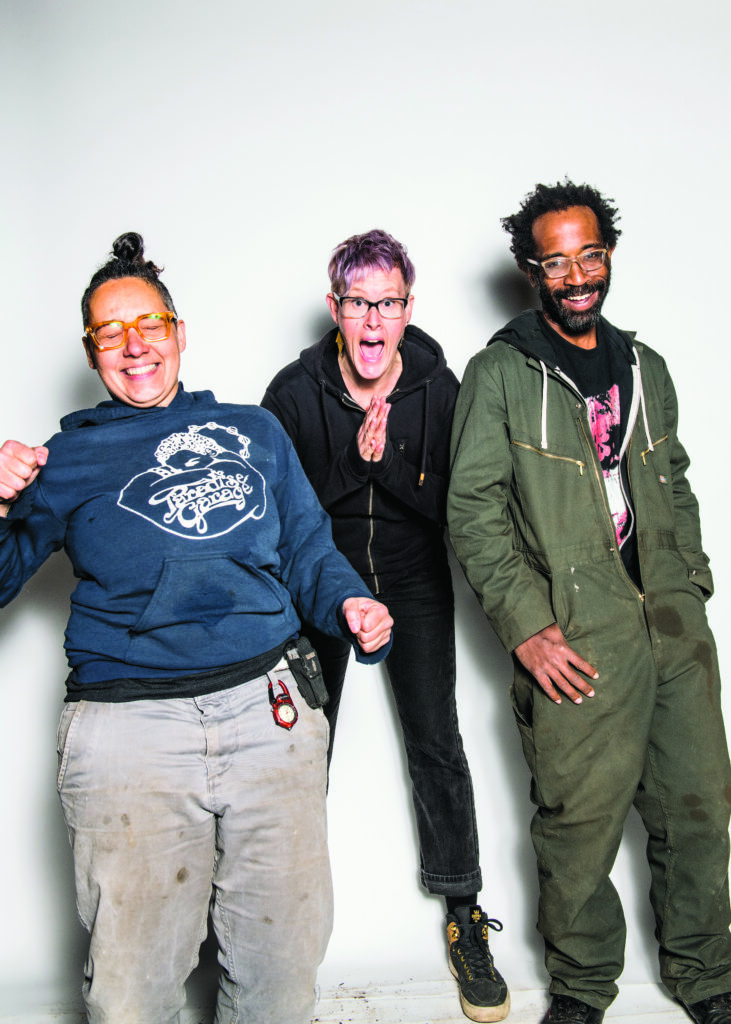How Rock Steady Was Born
The birth of Rock Steady Farm in Millerton was fast. “It was a spur-of-the-moment opportunity, not planned—whatsoever!” says co-founder Maggie Cheney, leaning forward and explaining with their signature mix of energy and laser-like focus. “But we were, like, ‘Holy shit, this is an opportunity to take over an existing farm and turn it into something else, and the land is gorgeous.’”
The process that led up to that decision involved years of study, work, and determination by all the co-owners. This was not a trust fund project. “Yeah, we started the business with $500 each and then we got the rest financed,” Cheney explains. The more than $100K loan they needed came from Seed Commons, a national community wealth cooperative. And that’s because Rock Steady Farm isn’t any old farm.
Who Is Rock Steady?
Rock Steady is queer* owned and operated cooperative vegetable farm rooted in social justice, food access, and farmer training. It’s run on organic-farming tenets, with a sliding-scale CSA that serves both the local community and many parts of NYC; it also works to generate safer spaces for queer and BIPOC (Black, Indigenous and People of Color) farmers to thrive. This year they received more than 316 applicants for the first year of their Pollinate queer farmer training program.
For co-founder D, finding where they truly felt a sense of belonging was not a simple path. “I barely graduated high school, I didn’t go to college. I worked jobs from construction and music production to restaurant work.” Nothing felt right until the move from the Jersey suburbs (where they were born and raised) to NYC generated a personal mission.
“I saw food disparities in the city I hadn’t ever seen living in NJ, and it was blatantly obvious. I had to know why Black and brown communities had less access to food and how to change it.” Once they started their journey, working in community gardening and educational projects like Farm School NYC, things changed. “It clicked for me. I found my community.”
Cheney’s journey was different. “My dad’s a farmer, I grew up just outside of Boston farming on and off my whole life.” That childhood experience constantly called them back to working the land, and yet, “It was a harmful journey to be a queer person in that world. I was always attacked because of my gender identity and sexual orientation.”
Instead of backing down, Cheney studied at University of California, Santa Cruz, Center for Agroecology and Sustainable Food Systems, where they co-founded the first Queer Farmer Field Day. “I kept asking, ‘How do we get different people in power? How we get queer people in power and try to create a farm that doesn’t harm the people who are employed there?’”
When, during a stint working on the farm, they discovered the business was up for sale, Cheney could feel that there was a chance to answer those questions. “I wanted to be a part of something that was creating something different—an alternative to what I had experienced my whole life. There weren’t ‘out’ farmers in my community and there weren’t farming cooperatives.”
D was ready to start enacting their vision. “I have worked in a lot of male-dominated industries and it’s amazing how we’re ingrained to laugh things off, the jokes … I don’t feel that way anymore. I don’t put up with that anymore.”
RELATED: The Upstate Farm Growing Specialty Produce for NYC Restaurants
Their Mission
Since its inception in 2015, the farm has become a hub of education and a place that many workers and visitors have shared is about a sense of healing and safety. “Rock Steady is a representation of wanting people to be their whole selves,” D explains. “It doesn’t matter if you have a learning disability. It doesn’t matter if you don’t know what gender you are. You’re here. You’re beautiful. Let’s farm.”
And inside that mission, another one: Food insecurity is a major issue even in states as affluent as New York. Rock Steady’s CSA serves all kinds of communities, with the help of a wide variety of charitable organizations. “We’re serving some of the most conservative people in this area, folks who voted for Trump and who are very different from us, but we know that they need food.” Cheney goes on, “And we partner with many pantry programs run at churches who might not believe in our sexual identities, but they will take our food.”
Overcoming Challenges
Both D and Cheney feel that while COVID created many challenges, including a massive uptick in food insecurity, it also generated opportunities for the farm to show its worth. “D and I have been talking about food insecurity for years, well before we were doing this. But when COVID hit, everyone got an education; they saw lines at the food banks and saw how the local food systems were critical.” The massive increase in CSA subscriptions created positive changes for the farm. “It’s been a journey to get to where we are now,” Cheney says, “but it’s crystal clear now that this is the work we’re supposed to be doing.” And pioneering a kind of farming that is for everyone is deeply satisfying. “You don’t have to be in the cities, where everyone says all the queer people are, where all the parades are. You can be on the farm.”
*According to the Rock Steady Farm website, “Queer for R.S.F. contains and includes multitudes of identities and expressions—lesbian, gay, bisexual, pansexual, asexual, intersex, transgender and all expressions of gender rebel siblings, including those who identify as gender non-conforming, non-binary and two-spirit.”




